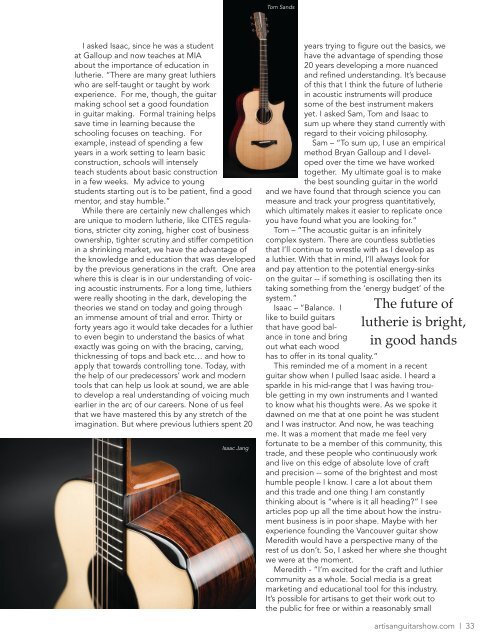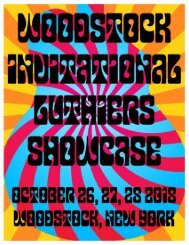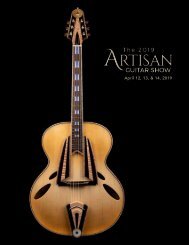2018 AGS Magazine
Magazine for the 2018 Artisan Guitar Show
Magazine for the 2018 Artisan Guitar Show
You also want an ePaper? Increase the reach of your titles
YUMPU automatically turns print PDFs into web optimized ePapers that Google loves.
Tom Sands<br />
I asked Isaac, since he was a student<br />
at Galloup and now teaches at MIA<br />
about the importance of education in<br />
lutherie. “There are many great luthiers<br />
who are self-taught or taught by work<br />
experience. For me, though, the guitar<br />
making school set a good foundation<br />
in guitar making. Formal training helps<br />
save time in learning because the<br />
schooling focuses on teaching. For<br />
example, instead of spending a few<br />
years in a work setting to learn basic<br />
construction, schools will intensely<br />
teach students about basic construction<br />
in a few weeks. My advice to young<br />
students starting out is to be patient, find a good<br />
mentor, and stay humble.”<br />
While there are certainly new challenges which<br />
are unique to modern lutherie, like CITES regulations,<br />
stricter city zoning, higher cost of business<br />
ownership, tighter scrutiny and stiffer competition<br />
in a shrinking market, we have the advantage of<br />
the knowledge and education that was developed<br />
by the previous generations in the craft. One area<br />
where this is clear is in our understanding of voicing<br />
acoustic instruments. For a long time, luthiers<br />
were really shooting in the dark, developing the<br />
theories we stand on today and going through<br />
an immense amount of trial and error. Thirty or<br />
forty years ago it would take decades for a luthier<br />
to even begin to understand the basics of what<br />
exactly was going on with the bracing, carving,<br />
thicknessing of tops and back etc… and how to<br />
apply that towards controlling tone. Today, with<br />
the help of our predecessors’ work and modern<br />
tools that can help us look at sound, we are able<br />
to develop a real understanding of voicing much<br />
earlier in the arc of our careers. None of us feel<br />
that we have mastered this by any stretch of the<br />
imagination. But where previous luthiers spent 20<br />
Isaac Jang<br />
years trying to figure out the basics, we<br />
have the advantage of spending those<br />
20 years developing a more nuanced<br />
and refined understanding. It’s because<br />
of this that I think the future of lutherie<br />
in acoustic instruments will produce<br />
some of the best instrument makers<br />
yet. I asked Sam, Tom and Isaac to<br />
sum up where they stand currently with<br />
regard to their voicing philosophy.<br />
Sam – “To sum up, I use an empirical<br />
method Bryan Galloup and I developed<br />
over the time we have worked<br />
together. My ultimate goal is to make<br />
the best sounding guitar in the world<br />
and we have found that through science you can<br />
measure and track your progress quantitatively,<br />
which ultimately makes it easier to replicate once<br />
you have found what you are looking for.”<br />
Tom – “The acoustic guitar is an infinitely<br />
complex system. There are countless subtleties<br />
that I’ll continue to wrestle with as I develop as<br />
a luthier. With that in mind, I’ll always look for<br />
and pay attention to the potential energy-sinks<br />
on the guitar -- if something is oscillating then its<br />
taking something from the ‘energy budget’ of the<br />
system.”<br />
Isaac – “Balance. I<br />
like to build guitars<br />
that have good balance<br />
in tone and bring<br />
out what each wood<br />
has to offer in its tonal quality.”<br />
This reminded me of a moment in a recent<br />
guitar show when I pulled Isaac aside. I heard a<br />
sparkle in his mid-range that I was having trouble<br />
getting in my own instruments and I wanted<br />
to know what his thoughts were. As we spoke it<br />
dawned on me that at one point he was student<br />
and I was instructor. And now, he was teaching<br />
me. It was a moment that made me feel very<br />
fortunate to be a member of this community, this<br />
trade, and these people who continuously work<br />
and live on this edge of absolute love of craft<br />
and precision -- some of the brightest and most<br />
humble people I know. I care a lot about them<br />
and this trade and one thing I am constantly<br />
thinking about is “where is it all heading?” I see<br />
articles pop up all the time about how the instrument<br />
business is in poor shape. Maybe with her<br />
experience founding the Vancouver guitar show<br />
Meredith would have a perspective many of the<br />
rest of us don’t. So, I asked her where she thought<br />
we were at the moment.<br />
Meredith - “I’m excited for the craft and luthier<br />
community as a whole. Social media is a great<br />
marketing and educational tool for this industry.<br />
It’s possible for artisans to get their work out to<br />
the public for free or within a reasonably small<br />
The future of<br />
lutherie is bright,<br />
in good hands<br />
artisanguitarshow.com | 33




